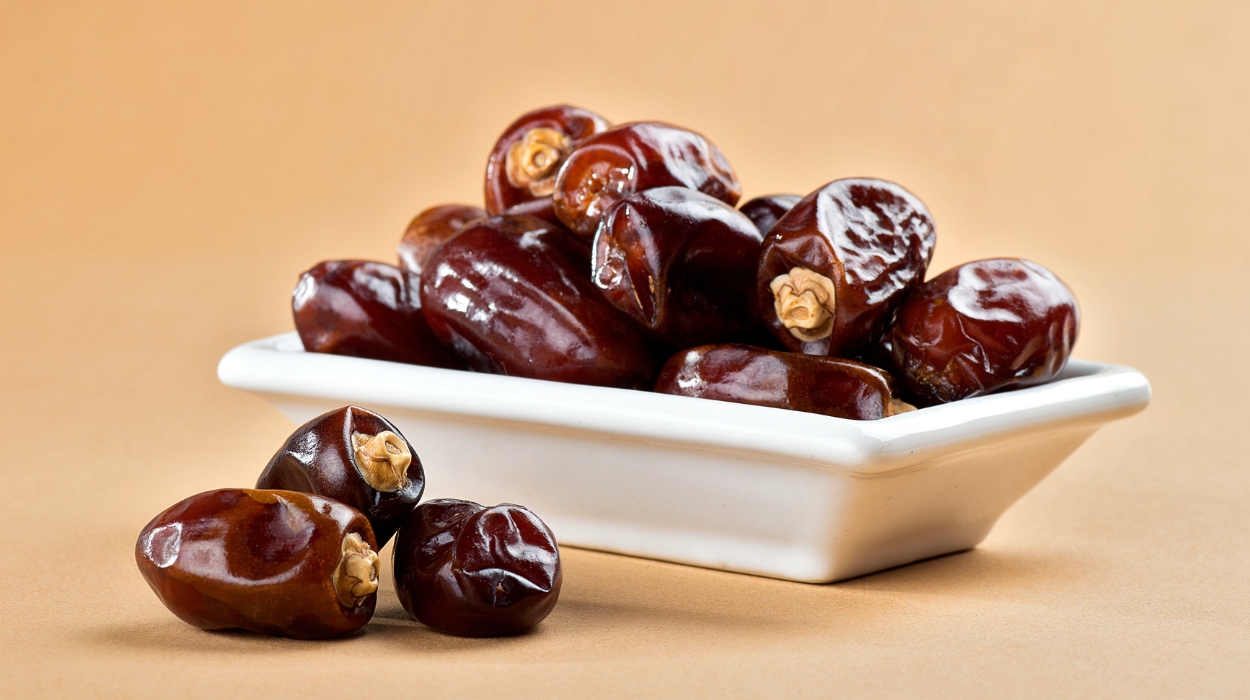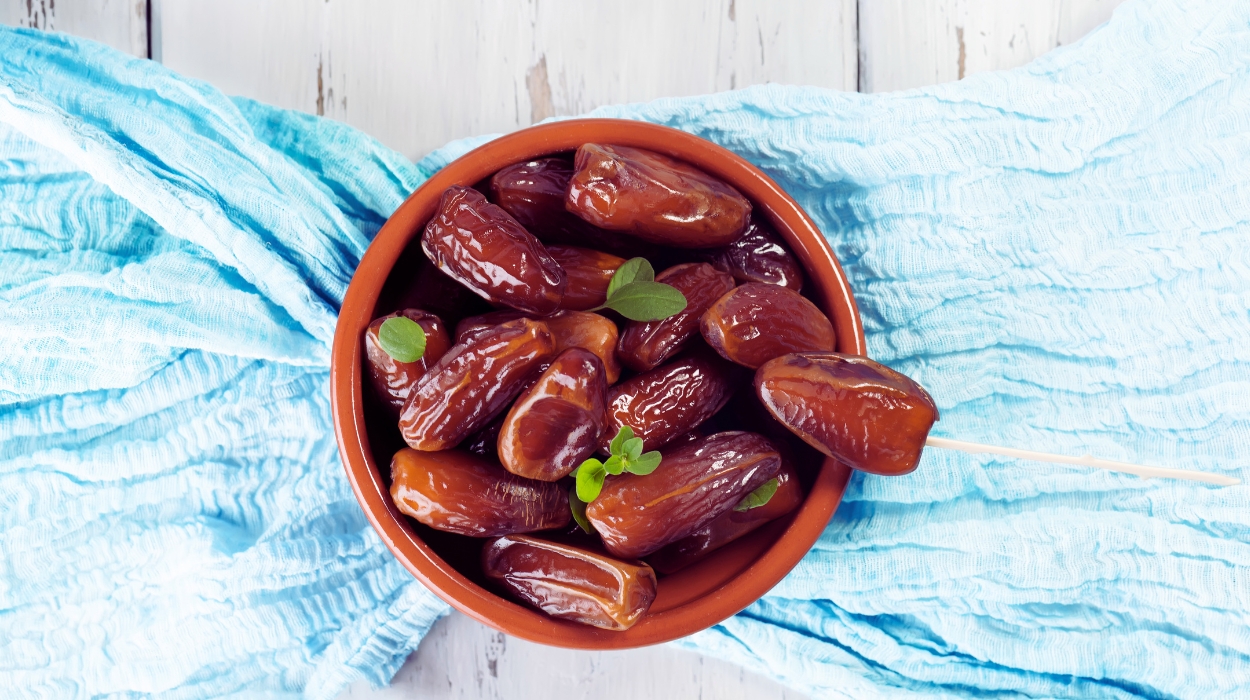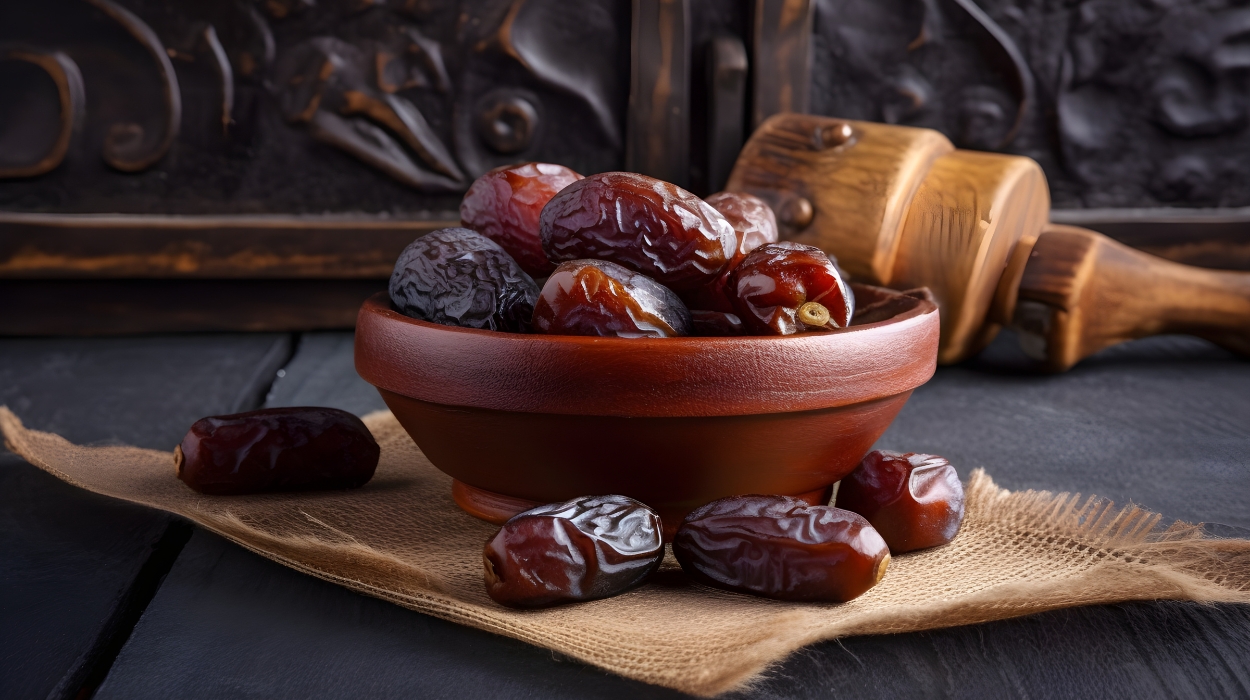While all dates have a high nutrient content and a wide range of potential health benefits, Ajwa dates are one of the most prized varieties. These healthy fruits are grown in Medina, Saudi Arabia, and contain a higher proportion of minerals[1] than other date varieties. This means that, alongside the usual health benefits of dates, Ajwa dates have additional properties that can keep your body strong and healthy.
Read on to learn more about the benefits of Ajwa dates and how eating these fruits can improve your body’s health and function.
What Are The Benefits Of Ajwa Dates?
- Anti-Cancer Properties.
- Promotes Healthy Digestion.
- Benefits Heart Health.
- Anti-Inflammatory Effects.
- Combats Nutrient Deficiency.
Health Benefits Of Ajwa Dates

Anti-Cancer Properties
Like other date varieties, Ajwa dates contain an abundance of antioxidants,[2] which are molecules that find and neutralize harmful free radicals in your body. If unaddressed, free radicals can cause DNA damage[3] and genetic mutations that may contribute to cancer. You can reduce your risk of developing cancer by eating Ajwa dates and other foods with antioxidant properties.
Ajwa dates also have anti-cancer properties that may inhibit the growth of cancer cells. One study[4] found that Ajwa date extract prevented breast cancer cells from replicating and even eliminated them in some instances. This suggests that Ajwa dates have potent anti-cancer effects that can potentially be useful in cancer treatment.
Promotes Healthy Digestion
Ajwa dates are rich in dietary fiber, which makes them effective for cleansing the digestive system. Fiber is essential for healthy digestion, and high-fiber fruits have the potential to alleviate digestive problems. Consuming Ajwa dates can stimulate bowel movement and help to relieve constipation[1] and, if eaten daily, may improve long-term gut health.
The polyphenols and fiber in date fruits may also contribute to a healthy gut microbiome.[5] The microbiome consists of all microorganisms in the body, including bacteria, viruses, fungi, and all of their genetic material. Maintaining a diverse and strong gut microbiome has a plethora of health benefits[6] including a lower risk of colon cancer, a stronger immune system that fights illness, and lower cholesterol levels.
Benefits Heart Health
Eating Ajwa dates may help remedy high blood pressure and improve your overall cardiovascular health.
Dates have the highest concentration of polyphenols among all dried fruits, and Ajwa dates are the most polyphenol-rich[7] of all date varieties. Polyphenols are naturally occurring compounds that are abundant in plants and are a valuable component of a healthy diet.
Ajwa dates have many health benefits thought to protect against a variety of health conditions,[8] including heart disease. This is because they have anti-inflammatory effects that benefit the circulatory system including both the heart and blood vessels.
Polyphenols found in dates can also regulate blood pressure. High blood pressure places someone at a greater risk[9] of cardiovascular issues, including heart attacks, heart failure, and stroke. Therefore, regularly eating dates (especially Ajwa dates) could help boost heart health[10] and reduce your risk of cardiovascular disease.
Anti-Inflammatory Effects
The same polyphenols in Ajwa dates that aid in heart health can also improve immune function[11] and help fight against bodily bacteria. Ajwa dates are just one example of a food rich in polyphenols that can fight inflammation, which helps ease the burden on your immune system[12] and can prevent illnesses such as COVID-19. Healthy immune function is key for fighting off infection, so regularly eating Ajwa dates could also help protect you from illnesses like colds and flu.
An anti-inflammatory diet can also reduce your risk[13] of more serious health concerns such as cancer, cardiovascular disease, and neurological conditions. In fact, more than 50% of deaths[14] across the globe can be attributed to the above conditions, many of which are caused by chronic inflammation. While it takes a lot of lifestyle changes to combat chronic inflammation, eating foods with anti-inflammatory properties, like dates, is just one practice that can help your long-term health.
Other anti-inflammatory foods[15] and spices that can bolster your overall health include fruits, vegetables, nuts, legumes, dairy yogurt, and turmeric.
Combats Nutrient Deficiency
Dates have a plethora of essential nutrients that can help combat a range of deficiencies that may be present due to someone’s diet. Ajwa dates contain rich source of micronutrients[16] including iron, calcium, potassium, phosphorus, copper, and magnesium. Individuals hoping to prevent malnutrition and other conditions[17] related to nutritional deficiencies should strive to get these essential nutrients from Ajwa dates and other sources.
What Are Ajwa Dates?

Dates are tropical fruits that grow on trees called date palms, or Phoenix dactylifera. Date fruit can be eaten fresh off the tree, but are most often consumed dried. There are several different varieties of date palm and the trees primarily grow in West Asia and North Africa.[18]
Ajwa dates are a type of date grown exclusively in Medina, Saudi Arabia. Dates are significant in the Islamic faith as the most favored food[19] of the prophet, Muhammad, and are traditionally used to break fasts during Ramadan.
Ajwa dates are particularly valued, as they are specifically recommended[7] for their health benefits in Hadith. Here, Saud narrated the words of the prophet: “If somebody takes seven Ajwa dates in the morning, neither magic nor poison will hurt him that day.”
The health benefits of Ajwa dates have since been confirmed[20] by numerous clinical studies that have verified their antioxidant and anti-inflammatory properties. Therefore, regularly eating Ajwa dates can help improve your diet.
Nutritional Value Of Ajwa Dates
One Ajwa date contains approximately 53 calories,[21] 6 grams[22] of carbohydrates, 1.7 grams of protein, 2.9 grams of fiber, and 0.2 grams of fiber. Dates are also a rich source of vital nutrients[23] including calcium, iron, magnesium, phosphorus, potassium, zinc, copper, manganese, and choline.
Are Ajwa Dates Healthy?
Ajwa dates have a high nutritional value and are an excellent source of dietary fiber. They are also rich in polyphenols, which are plant compounds with a range of antioxidant and anti-inflammatory effects. Therefore, regularly eating Ajwa dates may reduce the risk[7] of a variety of serious illnesses when combined with other lifestyle changes.
However, dates also contain a lot of natural sugars and are a high-calorie fruit.[21] Eating too many dates can contribute to weight gain and may also lead to an imbalance in blood glucose levels. So, unless you are trying to gain weight, it’s best to limit your intake to just a few dates per day.
In rare cases, consumption of dates may cause bloating, nausea, or sleepiness. This is usually seen in people with a condition called hereditary fructose intolerance.[24]
Ways To Eat Ajwa Dates
Ajwa dates have a soft texture and an intensely rich, sweet flavor that can quickly satisfy a sugar craving. Many people prefer to eat Ajwa dates just as they are, but they can also be added to other foods.
Thanks to their high sugar content, dates can also be used as a natural sweetener in baked goods. You can also add them to oatmeal, smoothies, roasted vegetables, or stews. Adding dates to your meals will boost their nutritional value and flavor profile.
If you are not interested in Ajwa dates and other fruits, you can also increase your daily nutrient intake by consuming green powder. Green powders are a type of fruit and vegetable supplement that can give you a quick and easy infusion of vital nutrients. The best green powders contain an abundance of vitamins and minerals found in green, leafy vegetables and have a variety of health benefits for immune function, cognitive health, and energy levels.
Conclusion
Dates, especially the Ajwa date variety, have multiple health benefits thanks to their abundance of essential nutrients. Dates are rich in polyphenols, which have strong antioxidant, antibacterial, and anti-inflammatory properties. They are particularly important in the Muslim religion, as Ajwa dates are mentioned in Hadith as the most favored food of the prophet, Muhammad.
Ajwa dates also contain a wide range of key minerals including copper, magnesium, calcium, iron, potassium, and phosphorus. This means eating Ajwa dates can help combat nutrient deficiencies[17] and improve general health in the long run. Finally, dates are a rich source of dietary fiber, which is essential for maintaining digestive health and can help protect against colon cancer.[25]
Frequently Asked Questions
Ajwa dates are specifically lauded for their health benefits by the prophet Muhammad in Hadith and, as such, have religious significance in Islam. They also contain a higher proportion of minerals than other date varieties, making them a great fruit option.
Both Ajwa and Medjool dates have significant health benefits, though they have slightly different nutritional compositions.[26] Ajwa dates contain more calcium than Medjool dates, but Medjool dates have a bit more potassium and magnesium.
All date varieties contain an abundance of dietary fiber and other nutrients. However, different varieties contain different amounts[27] of macro and micronutrients. For example, Ajwa dates contain higher levels of calcium[1] than other date varieties.
Ajwa dates have anti-inflammatory and antioxidant properties along with a full nutritional profile. Regularly eating dates can benefit digestive function, heart health, and immune function.
Ajwa dates are expensive because they are grown exclusively in Medina, Saudi Arabia. They are also prized for their religious significance, as they were the favored food of the prophet, Muhammad. This makes them quite valuable.
Ajwa dates are particularly favorable in Islam because they were preferred by the prophet, Muhammed, and are specifically recommended for their health benefits in Hadith.
 Evidence Based
Evidence Based
